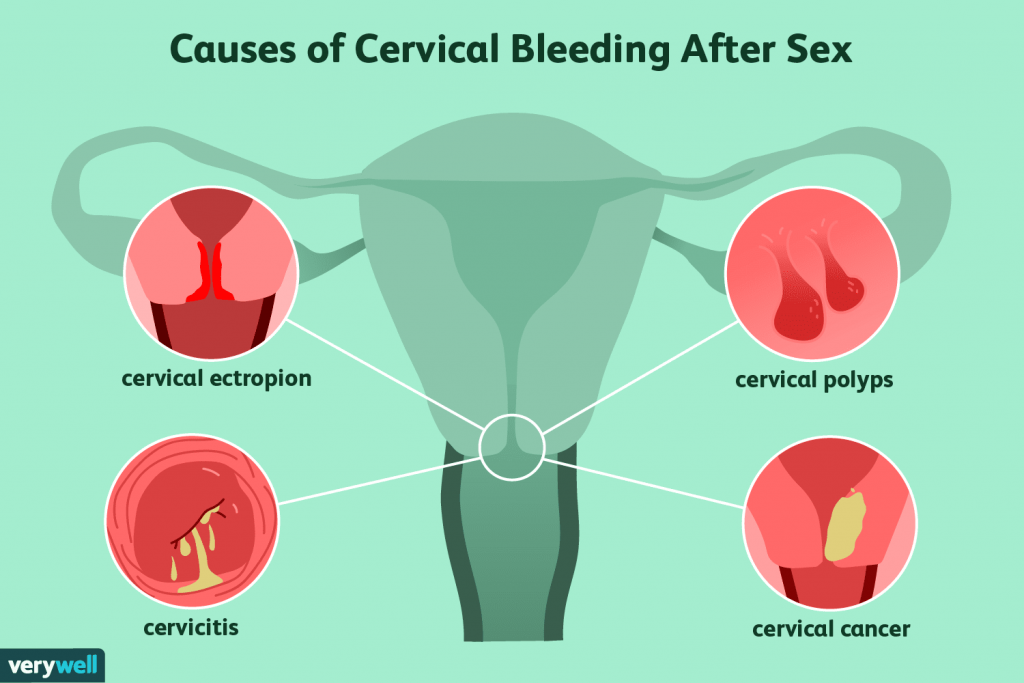
Bleeding after sex, more commonly known as post-coital bleeding, happens in as many as 9% of menstruating women. Approximately 63% of postmenopausal women are likely to post-coital bleeding due to vaginal dryness.
Women experience different sessions of bleeding, which may or may not be a cause of concern. If the bleeding is light, you don’t have to worry about it. However, in some cases, the bleeding may be heavy. In such cases, it is better to get checked by a doctor.[1]
Vaginal bleeding after sex can be a major turn-off. Honestly, it may make you think twice if you want to have sex the next time with your partner.[2]
More often than not, it’s happening because of an infection.
What causes bleeding after sex?
Bleeding after sex mostly occurs in the cervical region.
Cervicitis or cervical inflammation is one of the main reasons why you may be experiencing bleeding after sex. Generally, it is harmless and can be treated in the same way as any other STI, such as Chlamydia or gonorrhea.[3]
Cervical polyps, the growth of a mass around the cervix, is one of the main reasons for vaginal bleeding. Cervical polyps need to be operated, or they might turn into cancer.
However, it’s rarely something to worry about. More often than not, it’s due to an infection that you can treat with medication. From cervicitis to pelvic inflammatory disease or even STD’s, post-coital bleeding can happen due to different infections.[4]
Vaginal Tearing
A lot of couples are into rigorous or violent sex. While this may give you better orgasms, in some cases, it may leave behind scrapes around the vagina. Other factors such as menopause, breastfeeding, and vaginal dryness can also give way to vaginal tearing.
Genitourinary syndrome of menopause
Also referred to as vaginal atrophy, this is commonly observed in perimenopause and menopause women. Low estrogen levels hamper the reproductive system, thereby affecting the vaginal lubrication capacity. Low estrogen lowers the elasticity of the vagina, thereby making it thin. Hence, pain and discomfort during sex become standard in such scenarios.[5]
Vaginal dryness
Due to aging and certain infections, women often fail to achieve the required level of lubrication. This paves the way for vaginal dryness. Vaginal dryness can make sex uncomfortable and painful. Hence, the chances of vaginal tearing increase, thereby giving way to bleeding after sex.
Often, most of the causes of post-coital bleeding does not need any rigorous treatment since it goes away on its own. But, it is necessary to keep a check on the amount of blood to avoid the risk of any harmful condition.[6]
Is it serious or not?
Women may experience light bleeding at times after sex. However, if there is heavy bleeding, it may be a sign of concern.
It’s why experts still recommend visiting a doctor to get yourself checked. If you have been noticing spots of bleeding after every time you have sex, you need to consult a professional.
Often women may also experience bleeding after sex, right before or after their menstruation; this is considered to be normal. If you have been noticing bleeding after sex after any surgery or serious health condition, check if the problem reoccurs.[7]
Know the cause
Bleeding after sex is mostly due to vaginal dryness. Experts suggest that continuous post-coital bleeding may be a symptom of underlying health conditions, mostly STIs.[8]
Your profile could also indicate whether you are at a higher risk of experiencing post-coital bleeding. For instance, those in menopause, women who recently had a baby or still breastfeeding their child, as well as those not being fully aroused before intercourse, may have a greater risk.
Since there is a high risk of cervical cancer, the doctor will first examine you for that and conduct a biopsy. If cancer is confirmed, you will be sent to a profession.[9]
Even if it is ruled out, the doctor may check you for other potential causes by conducting the following
- Vaginal and cervical examination using a colposcope
- Urine test
- Vaginal ultrasound
- Blood test
- Vaginal discharge test

Treatment
Since there is a range of treatments for vaginal bleeding after sex, knowing the cause can be of great help.[10]
Lubrication
Artificial vaginal lubricants are easily available in the market. You may either apply these topically or consume it.
Natural aphrodisiacs such as Spanish Fly Pro can help to increase sexual arousal, and boost natural lubrication.[11]
If you are looking for products to be applied topically, you may prefer choosing water-based or silicone-based lubricants.
Since your vagina fails to lubricate enough for comfortable sex, the use of these artificial products can do the job.
Antibiotics
Based on your case, the doctor will also give you antibiotics to treat STD, inflammatory disease, and pelvic floor inflammation.[12]
You can treat cervical damage with cryosurgery.
What if I am pregnant?
Post-coital bleeding during pregnancy may not be a cause of concern often, provided it is light. Since extra blood vessels are developing in this region, you don’t need to worry.
How do I prevent bleeding?
There are two ways to go about it. You can lower down the lubrication level or use lubricant before and after sex to prevent bleeding.[13]
It is a good idea to wait for a few days if you have been noticing blood after sex. You should consult your partner and get the condition checked if it is too bothersome for you. So, before proceeding, make sure to check the cause.
[1] https://www.ncbi.nlm.nih.gov/pmc/articles/PMC4086375/
[2] Selo-Ojeme DO, Dayoub N, Patel A, Metha M. A clinico-pathological study of postcoital bleeding. Archives of Gynecology and Obstetrics. 2004;270(1):34–36. [PubMed]
[3] https://www.ncbi.nlm.nih.gov/books/NBK470230/
[4] Pretorius R, Semrad N, Watring W, Fotheringham N. Presentation of cervical cancer. Gynecologic Oncology. 1991;42(1):48–53. [PubMed] [Google Scholar]
[5] https://www.ncbi.nlm.nih.gov/pmc/articles/PMC1839021/
[6] Mawajdeh SM, Al-Qutob RJ, Farag AM. Prevalence and risk factors of genital prolapse. Saudi Med J. 2003;24:161–165. [PubMed] [Google Scholar]
[7] https://pubmed.ncbi.nlm.nih.gov/16762128/
[8] Seidlin M, Vogler M, Lee E, et al. Heterosexual transmission of HIV in a cohort of couples in New York City. AIDS. 1993;7:1247–1254. [PubMed] [Google Scholar]
[9] https://pubmed.ncbi.nlm.nih.gov/25045355/
[10] Kauraniemi T. Gynaecological health screening by means of questionnaire and cytology. Acta Obstet Gyn Scand. 1969;4:48. [PubMed] [Google Scholar]
[11] https://www.ncbi.nlm.nih.gov/pmc/articles/PMC3603873/
[12] Selo-Ojeme DO, Dayoud N, Patel A, Metha M. A clinico-pathological study of postcoital bleeding. Arch Gynecol Obstet. 2004;270:34–36. [PubMed] [Google Scholar]

